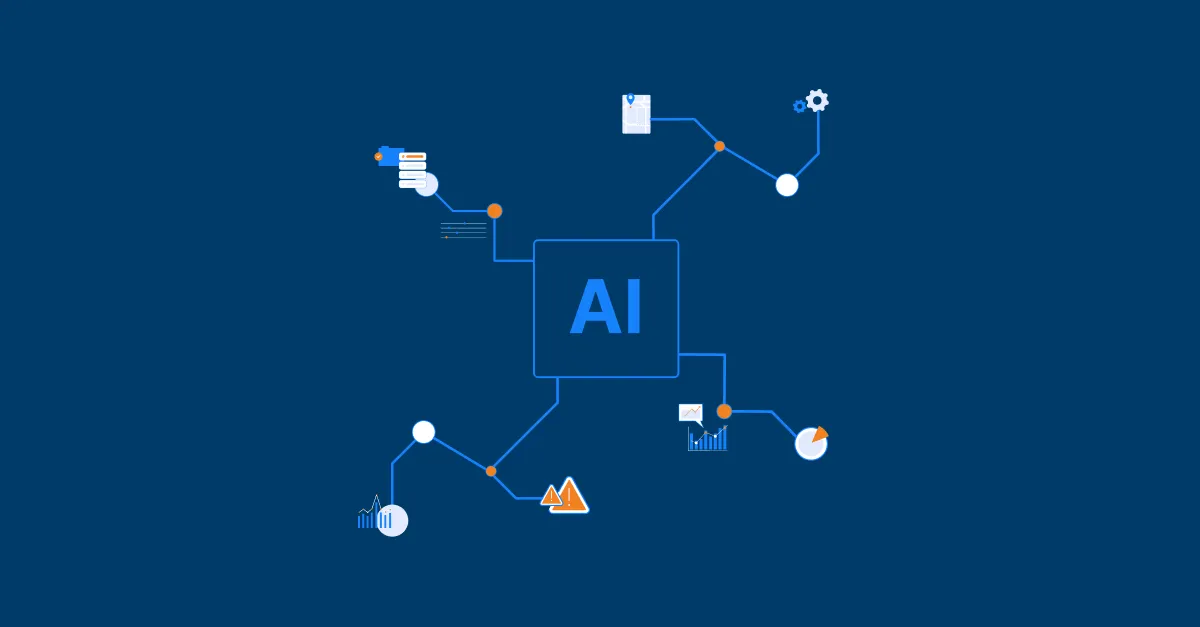What is AI in Supply Chain Management?

You're barely through a rushed, stale Pop-Tart for breakfast at your desk when your supply chain dashboard lights up like a Christmas tree. Another morning, another wave of fires to fight. Delayed shipments. Inventory gaps. That all-too-familiar knot in your stomach and crumbs on your shirt.
What if your morning looked different?
Picture walking in to find the fires already prevented — not by working longer hours, but by having AI analyze millions of data points while you rest. The future of AI in supply chain management has arrived, and the numbers tell a compelling story: 30% lower transport costs. 45% faster deliveries. 75% more accurate inventory predictions. 61% reduction in operational costs. And perhaps most importantly, a 6% jump in customer satisfaction.
Supply chain leaders watching their competitors pull ahead see these numbers as a wake-up call. The same challenges that keep you up at night — late shipments, stock emergencies, invoice errors — have become strategic advantages for companies embracing AI. From automated freight audits that uncover hidden savings to predictive analytics and anomaly detection that spot problems before they emerge, artificial intelligence transforms supply chain chaos into clockwork precision.
By the time you finish reading this article about AI in the supply chain, you’ll learn how, in the future, you might actually have time for a real breakfast while AI handles the heavy lifting.
AI in Supply Chain: Transforming B2B Logistics Operations
Every logistics manager relates to endless data pouring in, delivery schedules changing by the minute, and constant pressure to move goods faster while keeping costs down. That's exactly where AI in supply chain management helps, turning daily challenges into opportunities. Manual planning and gut decisions now give way to something far more powerful — intelligent systems that spot problems before they happen, adapt to changes instantly, and optimize your entire operation in real time.
Science Fiction to Reality: The History of AI
The logistics industry met "Artificial Intelligence" in 1956 when John McCarthy first proposed computers could think. Early logistics pioneers of the 1980s experimented with basic scheduling algorithms — rudimentary tools that nonetheless showed the potential of automated planning. The 1990s brought machine learning systems that learned from operational data, while the 2000s data revolution turned AI from an interesting experiment into a business necessity. Warehouse automation, network optimization, and real-time tracking soon became the standard.
Which brings us to today: AI is more mainstream (and human-like) than ever before. AI in supply chain forecasts now matches human accuracy, self-driving delivery vehicles roll out across major routes, and supply chain visibility has moved from wishful thinking to everyday reality. What once took a team of planners hours now happens automatically in seconds. Weather delays? Traffic jams? Demand spikes? AI handles it all, letting logistics professionals focus on growing their business instead of dealing with damage control.
The Key AI Technologies Reshaping Logistics
Ever had a chaotic Wednesday where your trucks break down, warehouses overflow, and five customers demand updates — all before lunch? Now imagine each of those problems being caught early and solved faster. Today's AI tools work together like a team to make this happen — some predict issues before they happen, others find smarter solutions instantly, and a few handle routine updates automatically. Let's break it down:
- Machine Learning (ML): The backbone of modern logistics optimization. ML analyzes shipping patterns, capacity utilization, and operational data to spot inefficiencies, detect anomalies, and predict potential disruptions before they impact operations.
- Predictive Analytics: Your operation's strategic planning engine. It transforms historical performance data into actionable forecasts, optimizing your network's inventory levels and resource allocation.
- Natural Language Processing (NLP): Powers automated documentation processing and stakeholder communications. It streamlines everything from customs paperwork to supplier coordination, cutting administrative overhead.
- Computer Vision: Advanced warehouse and yard management. These systems monitor inventory movements, guide automated equipment, and maintain real-time stock accuracy without manual counts.
- Autonomous Systems: Next-generation material handling and transportation3. From automated picking systems to self-driving yard trucks, these systems maximize throughput while reducing labor dependencies.
- Real-Time Analytics: Your network's performance monitoring system. It tracks KPIs across facilities and routes, automatically identifying optimization opportunities and managing exceptions.
How AI in Supply Chain Delivers Real Numbers, Not Empty Promises
Suppose it's 6:47 a.m. Your top SKU just hit zero in Dallas. Three containers from Shenzhen languish in customs. And your biggest retail partner wants next-day delivery across 12 new states — all while your logistics costs are up from last quarter. While traditional supply chains buckle under this pressure, AI-driven operations turn these exact challenges into measurable wins. Not through empty promises, but through verified results: Think 75% sharper forecasts and 30% lower transport costs.
75% Higher Forecast Accuracy: AI Makes Supply Chain Planning Actually Work
That 75% boost in accuracy from AI supply chain forecasting transforms your entire operation. Picture the real-world impact:
Your monthly inventory meetings evolve from defensive explanations into strategic planning sessions. Instead of reconciling conflicting spreadsheets, your team focuses on driving business growth. The old cycle of stockout emergencies and excess inventory headaches in distribution gives way to a smooth, predictable flow. Your warehouse staff no longer scrambles to fulfill rush orders, maintaining perfect balance while buyers confidently make decisions.
And perhaps the best part? Those uncomfortable "why don't the numbers match?" conversations simply fade away — because now, they always do.
30% Lower Transport Costs: AI Optimization Makes Every Mile Count
Recent studies show that AI-powered routing and load optimization reduce transportation costs by 30%. For complex distribution networks, this creates immediate savings across the supply chain. Your transportation team can start each morning focused on strategic work, not scrambling to fill half-empty trucks or arrange rushed shipments.
Meanwhile, dispatchers can shift from manual planning to building stronger carrier relationships and refining network performance. High-quality data provides clear visibility into operations, turning previous daily problems — low truck utilization, rushed orders, inefficient routes — into rare exceptions.
In leadership meetings, you'll highlight consistent cost savings rather than defend budget overruns. Smart, proactive management replaces reactive panicking, transforming your shipping network into a competitive edge that benefits everyone.
AI in Freight Audit and Parcel Invoice Auditing
Your shipping invoices cost you 5-8% more than they should, and the reasons are clear-cut. Billing errors, duplicate charges, and incorrect fees slip through unnoticed. The solution: AI-powered freight audits and anomaly detection solutions from companies like Intelligent Audit catch these expensive mistakes before they impact your bottom line.
How AI Automates Data Extraction and Auditing
Your team no longer needs to manually review endless shipping documents and comb over parcel invoice audits. AI tools instantly scan and process invoices through optical character recognition (OCR) and natural language processing. Systems like Intelligent Audit’s can automatically match purchase orders against shipment receipts and invoice data across 150+ checkpoints. But that’s only the start. Machine learning models get smarter over time, learning from each new document they process to spot errors with increasing precision. Leveraging such AI-powered audit tools, you can expect up to an 80% reduction in processing costs while achieving 99% accuracy rates.
AI-Powered Billing Verification and Cost Recovery
AI-powered solutions like those from Intelligent Audit work around the clock to scan every freight dollar you spend and flag expensive anomalies the moment they appear. You'll know immediately when a carrier suddenly hits you with a 10x spike in detention fees or slides in an incorrect $3,800 excess mileage charge. The proof is in real customer wins: one company caught a $1M fraud scheme through Intelligent Audit’s AI anomaly detection. At the same time, another discovered $500 in hidden accessorial fees they would have unquestioningly paid. Automated cost recovery alone can reduce your transportation spend by 2-5%. Once the AI spots billing problems, it handles the heavy lifting — submitting claims, tracking reimbursement, and converting those found discrepancies into real savings without burning your team's time.
Overcoming Challenges with AI in Supply Chain Adoption
Despite the transformative benefits, we’d be remiss if we didn’t acknowledge the challenges of implementing AI in your supply chain. Many organizations face common obstacles that can make the entire process overwhelming. So, here’s what you should watch for, along with practical ways to address them:
- Data Security in an Interconnected World: AI systems require access to vast amounts of sensitive supply chain data, so organizations must address privacy concerns while protecting information from breaches. Studies show that 40% of companies struggle to balance data accessibility with security.
- Making AI Decisions You Can Trust: Nobody wants a "black box" making critical supply chain decisions. The key is implementing explainable AI solutions that provide clear reasoning behind recommendations, helping your team understand and validate the logic.
- Breaking Through the "We've Always Done It This Way" Mindset: Change is hard — especially when introducing AI to teams comfortable with existing processes. Success requires showing AI as an enhancer rather than a replacement, with phased rollouts demonstrating clear wins.
- Bridging the Skills Gap: Estimates show that 40% of the workforce needs AI reskilling, so the talent gap is real. Focus on upskilling current employees while strategically hiring for critical AI roles to build a future-ready workforce.
- Keeping AI Aligned with Business Goals: The most successful AI implementations start with clear business objectives, not technology for technology's sake. Create a strategic roadmap that ties every AI initiative directly to measurable supply chain outcomes.
Beyond Crisis Management: AI That Actually Delivers
You're sorely mistaken if you think manual processes and gut decisions will keep your operations ahead of the pack. Today's leading supply chain operations leverage AI to convert daily headaches — delayed shipments, stock emergencies, invoice errors — into strategic advantages. The impact extends beyond the numbers (though we assume nobody has a problem with 75% more accurate forecasts and 30% lower transport costs). Teams evolve from constant troubleshooting to proactive strategy, carrier relationships strengthen through data-driven decisions, and logistics managers finally gain the bandwidth to drive meaningful innovation across their networks.
Intelligent Audit's 27-year track record proves the power of smart automation in supply chain operations. After analyzing over $1B in shipments in 2023 alone, their AI platform consistently helps companies uncover hidden savings, prevent costly errors, and optimize complex logistics networks. The results resonate with logistics professionals at every level. Whether you're a global enterprise moving thousands of containers or a growing business looking to optimize your shipping spend, their team understands your real-world challenges.
So why not see how Intelligent Audit's platform can help you leverage AI to solve today's logistics challenges while preparing for tomorrow's? Get started today and discover how intelligent automation can benefit your entire supply chain.



